- Home
- Hugh Howey
Resist Page 20
Resist Read online
Page 20
Him: uh hi it’s bryan
Me: i know i’m sitting right here but it’s maria in case you forget
We laugh and put away our phones before Mrs. Koenig confiscates them.
“So do you want to come over tomorrow to work on the project?” he asks. “After school, I mean. My dad will be home, he works from home, so it’s not like…”
“Yeah, sure,” I say. “It’s just Calculus.”
But I like that he’s as confused about it as I am, and I like that his dad will be home. I’ve never been to a guy’s house before, not for school or fun, and it’s nice that he recognizes that it would be weird to be alone there when we’re supposed to be working on math and are both thinking about something else. I like Bryan, and I really, really want him to pass this weird pH test that I’ve become. I feel, deep down, like he’s a good guy. And for his sake, I hope I’m right.
When the bell rings, he walks me to my next class, our shoulders almost touching.
It’s awesome.
“I’M GOING TO Bryan Kim’s house after school tomorrow to work on Calculus,” I tell my mom that night.
She puts down her wine and leans back against the granite countertop, mouth turned down. “Do I know this boy? Who are his parents?”
“Um, I don’t know who you know. His mom’s a dentist and his dad does IT. They live in Foxhall. He’s in the National Honor Society.” When she doesn’t acknowledge any of that, I add, “He’s a nice boy, and he doesn’t do sports. His dad will be there.”
She pulls her old address book out of a drawer and flips through it. “Is his mom Sheila Kim? I think I played tennis with her ten years ago. She was quiet.”
“Bryan’s quiet, too.”
Mom nods and picks up her wine glass. “Okay, but be careful. Don’t let him make you do anything you don’t want to do. Boys your age …” She shakes her head, and I can see her reliving old memories.
I don’t tell her it’s not just boys my age. It’s old men at the hotel bar, and the nice dads you babysit for, and college guys with guitars, too. It doesn’t matter what age they are, what race they are, how much money they have. It’s a free country when it comes to saying things about a girl’s body, looking at it with proprietary eyes, or sometimes taking what they can from us, with or without our consent and consciousness. It’s a free country when a man rules his household, when he has one drink too many and pushes his family too far and no one talks about the bruises in the morning, about the red marks on our cheeks and the holes in the wall we cover up with family portraits.
I don’t tell her any of that, because the way she’s sipping her wine tells me that she knows, she already knows.
She knows, and there’s not a single thing she can do about it.
But I can.
THERE’S A KNOCK on my door when I’m reading myself to sleep. I think it’s my mom, but it’s really my dad. I can smell the beer on him from across the room, and I wince. He never comes into my room, which is why it feels safe. And now it doesn’t.
“Your mom said you had a boyfriend,” he says, leaning against the door to stay upright.
“I’m going to a boy’s house to work on a Calculus project,” I say, careful to keep my voice neutral and not let him hear the disgust. “His dad will be home. No big deal.”
“It’s just that you’ve been dressing different. Acting different.” His eyes accuse me of something I haven’t done, something different than what his mouth is saying.
I pull the covers up and put the book down. “You told me to stop being weird, so I’m acting more normal. Isn’t that what you want?”
He weaves across the room to sit on the edge of my bed, and I pull my feet up, drawing my knees to my chest.
“You know, I was at the country club last summer with Ed, and there was this girl by the pool, and she was just…” He gives a low whistle and burps. “Smoking hot. Everything a woman should be. Long blonde hair, little bikini, perfect body. And Ed says she’s in your class. Isabelle Boone? And I told him I couldn’t believe it, that you and her were the same age.”
I exhale slowly, my hands in fists. “Are you saying you wish I was more like Isabelle Boone?”
“What? God, no.” He shakes his head, aghast, and puts his foot across his knee like he might stay a while. “I’m just saying that you need to be careful. Going to this guy’s house. Wearing red lipstick. How you dress. You don’t want to give guys a reason.”
“A reason to what?”
He sighs. “Just be careful.”
He looks like he’s going to pat my knee or something, like he’s real pleased to have dropped his wisdom on his only daughter, who might be a lesbian or a slut, depending on what she’s wearing and how drunk he is at the time.
“You be careful, too, Dad,” I say, scooting away from his touch.
“Me? Careful of what?” He laughs like it’s the funniest thing I’ve ever said.
“People like me.”
I shove out from under the covers and head for the door. I can’t be in the room with him for a second longer. Drunk as he is, he manages to surge up from the bed and grab the top of my arm, just above the elbow, hard enough to leave a bruise.
“Are you threatening me? In my own home?”
I still my breathing, look him in his bloodshot eyes. “Let go of me, Dad.”
“Not until you show me some respect.”
“You’re bruising me.”
“Good.”
He squeezes tighter, and I can feel his fingers pressing into my bones.
“You’re supposed to protect me, Daddy,” I say, and it comes out a whimper.
“No, I’m supposed to teach you to be good in a bad world.”
In the silence after his words, I go cold and rigid all over.
“Oh, you have.” I jerk my body away, and he almost falls over. “I hope one day someone teaches you as much as you’ve taught me.”
I hurry out of my room and lock myself in my bathroom before he can catch me. As I rub the bruises he left on my arm, I can’t stop the flood of images spilling through my mind. His hand crushed by a hammer, the little bones all shattered. His arm ripped out of the socket like a chicken’s raw wing. Him screaming and screaming and screaming while I’m as silent as he’s always preferred me to be.
Silent and good.
Not Isabelle Boone, not a weirdo hiding in a hoodie. Something in between that doesn’t trigger his anger and disgust. Some random, nebulous, arbitrary, imaginary girl that he decided, when I was a baby, I would become.
I wonder who that girl is and if she’s happy.
I wonder if she has any idea who she is or who she wants to be.
I will never be that girl, so I just wonder what will happen to my dad, now that I’ve wished for revenge.
CAN YOU GUESS?
Here’s a hint: Something got caught in the lawn mower, and my dad tried to get it out.
He lost his right hand.
I can’t say that I’m sorry.
He shouldn’t have bruised my arm.
I FEEL VERY pretty as I ring the doorbell of Bryan’s house. It looks like a happy house, like they don’t worry about money but still laugh at their garden gnomes and like somebody else cuts the grass. I’m wearing a tee and a cardigan and skinny jeans and flats and a necklace with a moon on it that I bought at the boutique by the coffee shop using the last of my babysitting money. My lip gloss tastes like cupcakes whenever I smile.
Bryan answers the door with a grin, his eyes focused on my face. That’s one of the things I like about him—he doesn’t look me up and down like he’s sizing up a Christmas present. He’s wearing the same band shirt he wore to school, low-slung jeans, and black socks. Something about him not wearing shoes is adorable. I could totally stomp on his feet right now, and it makes him seem like a little boy.
“Hey! Dad, this is Maria. Maria, this is my dad.”
There’s an older version of Bryan standing just behind him, and he holds out his hand and
smiles and says, “Nice to meet you, Maria. Please call me Mike.”
“Nice to meet you,” I say, because the last man who told me to call him by his first name tried to feel me up in his car between a locked door and a sleeping toddler. But Mr. Kim—Mike—has the same innocent sweetness as his son and hasn’t so much as glanced below my neck, and I know, because I always watch now.
“We’ll be in the kitchen,” Bryan says, and he inclines his head down the hall.
I follow him, Calculus book crushed to my chest, soaking in his world. Family pictures and bad watercolors line the hall, including a few framed crayon drawings with Bryan’s name scrawled across the bottom.
“You’re an only child, too, huh?” I say, and he laughs and rubs the back of his head.
“Yep. Welcome to the Shrine of Bryan.”
His kitchen is well-lit, and there’s a bag of sweet potato chips and two bottles of water sitting out on the counter.
“Thought you might be hungry,” he says, and I can tell he’s really nervous.
“You thought right,” I say, and we pull out our papers and start working.
It’s easy, being with him, once the awkwardness melts away. Our fingers absentmindedly graze in the sack of chips, and we both pull away, blushing. We finish the project early but linger over the papers, talking about the band that’s playing downtown next week and if the girl in our Calc class who’s been missing so much class and gaining so much weight is pregnant or what. Bryan doesn’t seem gossipy about it, though—more worried for her.
“I heard Chad and his friends talking about her before … you know.” Bryan shakes his head. “Talking about stuff they’d done at a party, calling her names. I just hope they didn’t … that she wasn’t … I just hope she’s okay. Those guys are jerks.”
“Yeah, they are,” I say, and I close my eyes for a moment and think about the three goons who helped pen me in by my car, and I imagine them being thrown out of an airplane and falling and falling and falling and splattering on the ground in a thousand pieces.
Bryan’s mom comes home, still in her dental scrubs, and she’s so nice to me, and asks me all the right questions about school and my future, and we all just stand around the kitchen, laughing and smiling and being the way people should be. Bryan’s parents really like him, and they’re so proud of him, and they just seem really glad to see me, to learn more about me. I kind of want to stay in their kitchen forever.
“I should go,” I say, although I don’t want to. If I’m home too late, my dad’ll have something to say about it, and I don’t think I can deal with him missing both hands.
“Oh, I made something for you. It’s in my room. Hold on.” Bryan grins and jogs upstairs, and his mom asks if my mom still plays tennis, and I tell her no, and she looks wistful.
I feel all rosy inside, wondering what he made for me. I didn’t know people made things for each other anymore. I can see the stairs from my stool in the kitchen, and I’m watching for him to reappear. He’s smiling when he comes into view, holding a CD or a DVD or something silver and flashy in a jewel case.
When his foot hits the second stair, he slips and falls backward. I gasp, and his parents turn, and I bolt toward him as he tumbles and tumbles down all eighteen stairs, his limbs and head all going in every direction and slamming into each wooden step.
It feels like slow motion, and he lands on the floor before I can get to him. His parents are right behind me, his mother trying to straighten his neck and his father fumbling with his cell phone. I pick up Bryan’s wrist, and the bone is poking out the side, and I feel for a pulse even though I know there can’t be one because his head is at an impossible angle and his mother is moaning and his father is shouting into the phone about an emergency and hurry and help him.
His mom’s CPR doesn’t help. The ambulance can’t help. Nothing can help.
Because he fell and fell and fell and splattered on the ground in a thousand pieces.
I sit in my car and watch the ambulance pull out of the driveway, no lights on, the Kims’ SUV following it. There’s blood on my hands, and I wipe it off on an old hoodie in the backseat before slipping it on and pulling the hood up.
I thought I was karma and revenge.
But Bryan was good and sweet, and now he’s gone.
Because of me.
Because we touched while we were eating organic snack chips.
I put his CD into the stereo, and the first threads of The Heavy’s “What Makes a Good Man” slam out of my speakers, and I start crying and crying and crying.
I can’t control this thing inside me.
I can’t pick and choose, can’t play God.
I’m as much of a monster as they are.
Maybe life was better when I was hiding.
ON FRIDAY AFTERNOON, I walk out to my car. I’m in a hoodie and stompy boots, wearing a baseball cap and sunglasses and gloves and big headphones.
It’s the only way.
I don’t want to touch anyone, accidentally make a connection. I can’t control my thoughts, can’t control my hate, but I can control who I touch and who I let touch me. I want to be good. For Bryan, and for guys like Bryan. I never really got to touch him, and now I never want to touch anybody ever again.
Something yanks me backward by my hood, and I spin around and glare.
“Heard your little fag boyfriend died,” says some dude in a football jersey.
And I never thought I would do this again, but I pull down my headphones. Bryan’s music blares through the speakers as they dangle around my neck. Rage sings through me in time with the bass, in time with my heart.
“How can he be both a fag and my boyfriend?” I say.
“You tell me, freak.”
I lick my lips, smile, and take off my gloves.
I don’t know his name. Don’t know if I’ve ever seen him before. Every guy in a jersey or a letterman’s jacket looks the same to me. They always have. And they’ve always called me names. I step close and pat him gently on the cheek.
“I hope you win tonight, dude. I hope you guys just burn up that field, destroy the other team, and party until you drop. I hope you’re all on fire.”
And I can see it, in my mind. The whole stadium full of people, screaming in a riot of flames and smoke and blood. Collapsed bleachers, locked gates, no survivors. Because anyone who worships guys like this, who lets them get away with what they do to girls like me and the girl now missing from my Calc class—they deserve the same fate.
Football dude looks half turned on and half freaked out, like he doesn’t know what to say to that. He stares into my eyes, and I see nothing but a scared little boy who doesn’t know what to do with a girl like me, a little boy who’s afraid of rejection and sexual confidence and indifference and anything but a pliant smile and a ready body and silence.
I look into his eyes, and I see terror.
“What’s your problem?” he manages to splutter.
“You were,” I say and walk away.
MONA LISA SMILE
BETH REVIS
AT EXACTLY SEVEN o’clock in the evening, every vid screen in the nation illuminated with Alexoi Dempsley’s smiling face.
“This is going to be a good one,” Penny’s roommate, Billie, said as she leaned closer to the vid screen. Billie, like most people in the nation, had something of a crush on Alexoi Dempsley. It wasn’t hard, given his charisma and charm, accentuated by a chiseled face and an easy grin.
Penny hated him.
Billie settled into the couch with a relaxing sigh. The seven o’clock program was mandatory viewing for all citizens, providing a daily update from the government. Most families scheduled their lives around the program—parents and children gathered for supper in front of the vid screen, ending with dessert as the Prime Chancellor gave his pre-recorded closing remarks. Lower class workers marked the shift change during the program; parties among the upper class never started until after the program ended. The very elite had holo action view
ers; the program was always live cast, and with the holographic display, it seemed as if handsome Alexoi Dempsley was actually sitting in the fancy sitting room of the elite, talking directly to each person.
“Today’s program,” Alexoi’s voice rang out through the speakers on Penny’s cheap, flat vid screen, “is about art.”
Billie squealed with anticipation, nudging Penny.
“And we have a special treat!” Alexoi clasped his hands together. “Please welcome Senior Art Director, Lev Reichs!”
A man in his fifties stepped into view. He was tall enough to offset the paunch at his waist, and his salt-and-pepper hair gave him a bit of a distinguished look that he wouldn’t have had a decade ago.
“Thank you for having me,” Director Reichs said, smiling as he sat down in a chair opposite Alexoi.
Alexoi’s face turned grave. “First, we should address the…unhappiness that has fallen upon some members of the Citizenry.”
Director Reichs nodded. “Let’s. Last month’s events were a test of our Prime Chancellor’s mercy—”
Billie snorted.
“—and of course, His Excellency rose graciously to the occasion.”
Alexoi didn’t recap the story; everyone knew it. A street artist known only by initials—S.Y.B.L.—had grown increasingly daring in their graffiti, going so far as to deface the Prime Chancellor’s own home. No one knew who the artist was. The initials could have been a name—most people referred to the artist as Sybl, pronouncing it like the old Greek oracle, “sybil.” Detectives theorized that each initial represented a different person, and that the defacing art was done by a group, not an individual. Rumors abounded—Sybl’s art was done by the Prime Chancellor’s discontent son; it was marketing ploy by one of the major corporations; it was clues about an upcoming terrorist attack; it was a distraction implemented by the government so the public didn’t notice new restrictive laws being passed.
A nationwide manhunt had resulted in nothing for years, but eventually, Sybl was caught. And it was just a girl. Skinny and short, with gripper shoes and rock-climbing muscles that enabled her to scale walls, equipped with nothing more than cans of synth paint and a cocksure attitude.

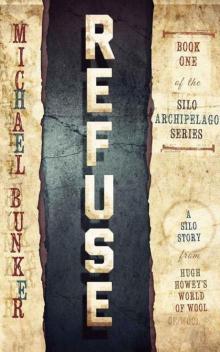 Refuse (The Silo Archipelago Series Book 1)
Refuse (The Silo Archipelago Series Book 1)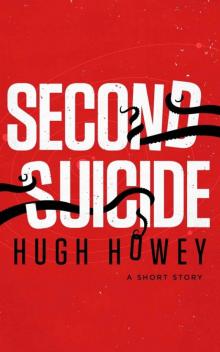 Second Suicide: A Short Story
Second Suicide: A Short Story Machine Learning: New and Collected Stories
Machine Learning: New and Collected Stories The Walk Up Nameless Ridge
The Walk Up Nameless Ridge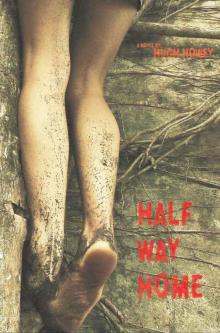 Half Way Home
Half Way Home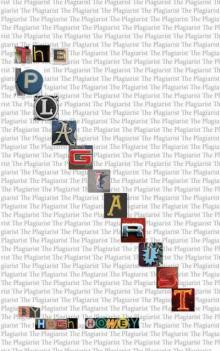 The Plagiarist
The Plagiarist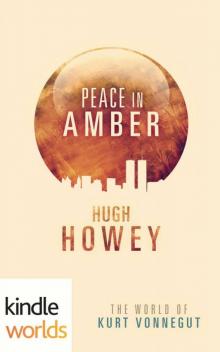 Peace in Amber
Peace in Amber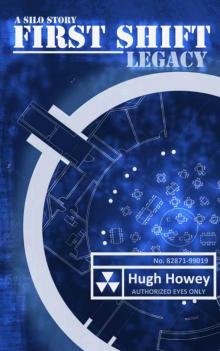 First Shift: Legacy
First Shift: Legacy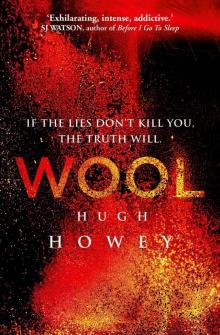 Wool
Wool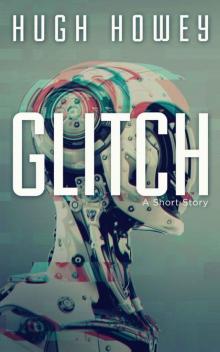 Glitch
Glitch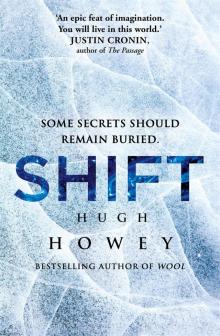 Shift
Shift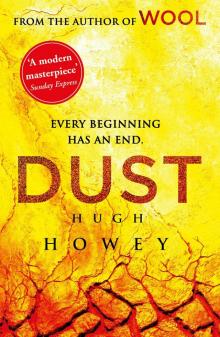 Dust
Dust Molly Fyde and the Land of Light
Molly Fyde and the Land of Light The Shell Collector
The Shell Collector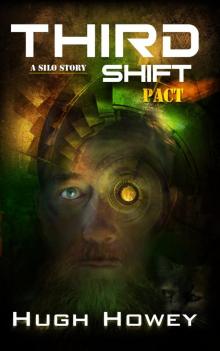 Third Shift: Pact
Third Shift: Pact Molly Fyde and the Fight for Peace
Molly Fyde and the Fight for Peace Sand Omnibus
Sand Omnibus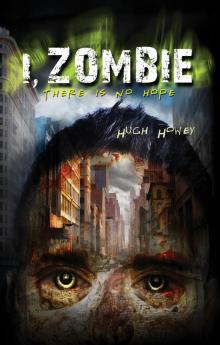 I, Zombie
I, Zombie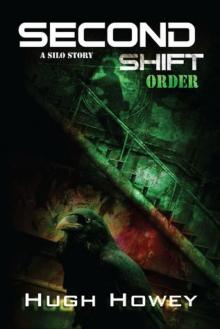 Second Shift: Order
Second Shift: Order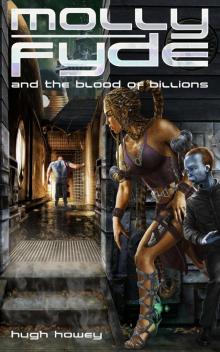 Molly Fyde and the Blood of Billions
Molly Fyde and the Blood of Billions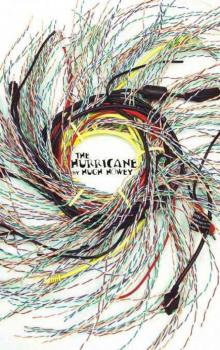 The Hurricane
The Hurricane The Box
The Box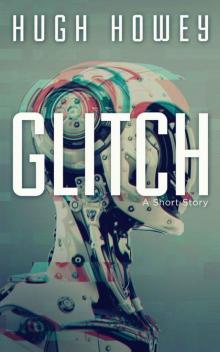 Glitch_A Short Story
Glitch_A Short Story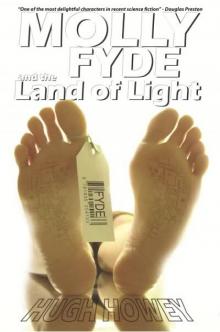 Molly Fyde and the Land of Light tbs-2
Molly Fyde and the Land of Light tbs-2 Machine Learning
Machine Learning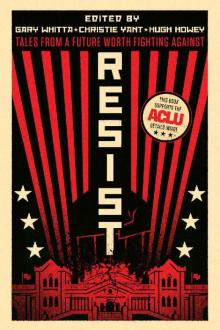 Resist
Resist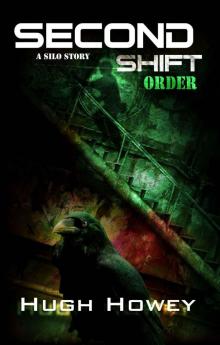 Second Shift - Order (Part 7 of the Silo Series) (Wool)
Second Shift - Order (Part 7 of the Silo Series) (Wool)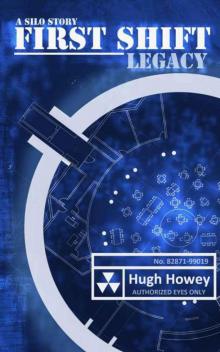 First Shift - Legacy s-1
First Shift - Legacy s-1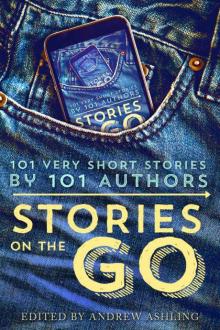 Stories on the Go: 101 Very Short Stories by 101 Authors
Stories on the Go: 101 Very Short Stories by 101 Authors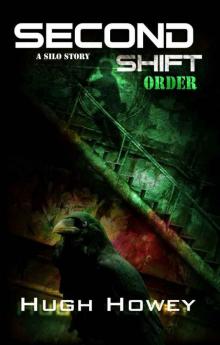 Second Shift - Order s-2
Second Shift - Order s-2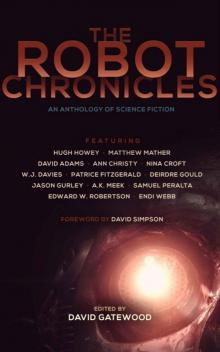 The Robot Chronicles
The Robot Chronicles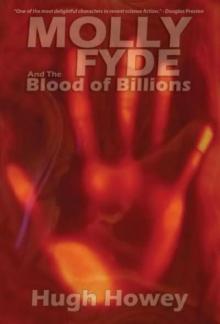 Molly Fyde and the Blood of Billions tbs-3
Molly Fyde and the Blood of Billions tbs-3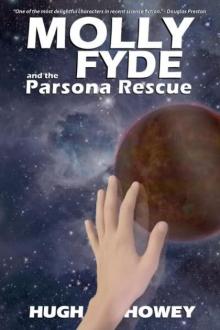 Molly Fyde and the Parsona Rescue tbs-1
Molly Fyde and the Parsona Rescue tbs-1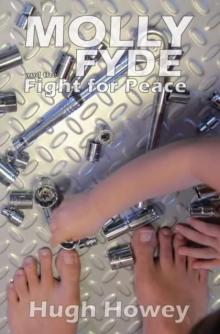 Molly Fyde and the Fight for Peace tbs-4
Molly Fyde and the Fight for Peace tbs-4 Sand
Sand The Walk Up Nameless Ridge (Kindle Single)
The Walk Up Nameless Ridge (Kindle Single) Wool Omnibus Edition (Wool 1 - 5)
Wool Omnibus Edition (Wool 1 - 5)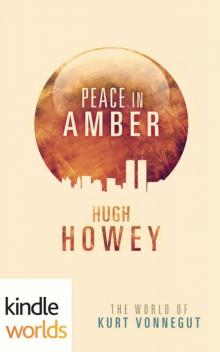 The World of Kurt Vonnegut: Peace in Amber
The World of Kurt Vonnegut: Peace in Amber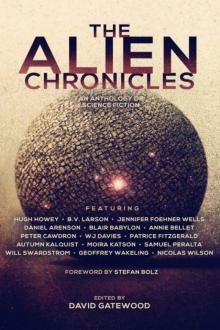 The Alien Chronicles
The Alien Chronicles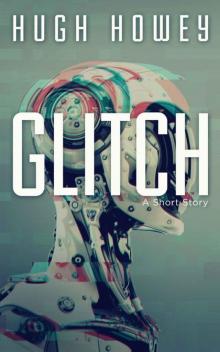 Glitch: A Short Story (Kindle Single)
Glitch: A Short Story (Kindle Single)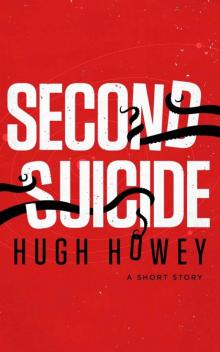 Second Suicide: A Short Story (Kindle Single)
Second Suicide: A Short Story (Kindle Single)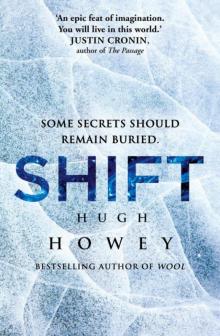 Shift (silo)
Shift (silo)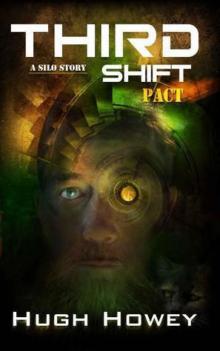 Third Shift - Pact
Third Shift - Pact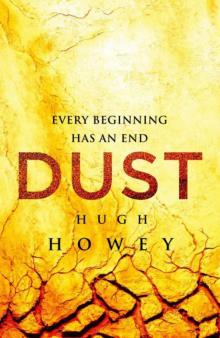 Dust s-9
Dust s-9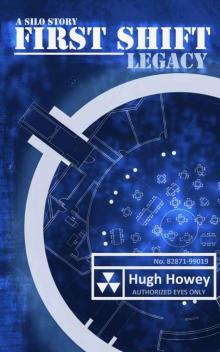 First Shift - Legacy (Part 6 of the Silo Series) (Wool)
First Shift - Legacy (Part 6 of the Silo Series) (Wool)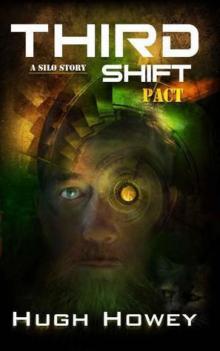 Third Shift - Pact s-3
Third Shift - Pact s-3 Sand: Omnibus Edition
Sand: Omnibus Edition The Box: A Short Story
The Box: A Short Story